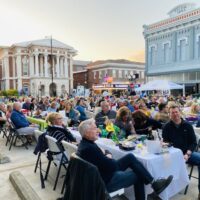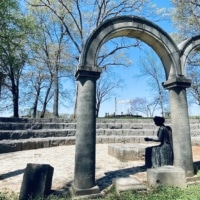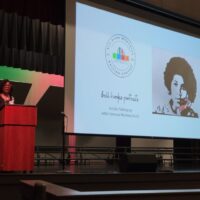Saturday morning, the eve of what would have been Gloria Jean Watkins’ 70th birthday, several dozen Hopkinsville women met for a brunch at Virginia Street Baptist Church to talk about her legacy as the author bell hooks.
Museums of Historic Hopkinsville-Christian County executive director Alissa Keller brought the group together with help from bell hooks’ sister, Gwenda Motley, and Francene Gilmer, director of the Christian County Literacy Council and a longtime friend of the Watkins family.
They asked me to speak briefly about my favorite bell hooks book, “Belonging: A Culture of Place.”
Here’s what I wrote to prepare for my talk:
bell hooks wrote “Belonging” after moving back to Kentucky to teach at Berea College. Returning to Kentucky was not something that anyone ever expected her to do. The book was published in 2009.
In the preface she wrote, “During the writing of these essays, Rosa Bell, my mother, began to lose her memory, to move swiftly into a place of forgetfulness from which there is no return. Witnessing her profound and ongoing grief, about this loss, I learn again and again how precious it is to have memory.
“We are born and have our being in a place of memory. We chart our lives by everything we remember — from the mundane moments to the majestic. We know ourselves through the art and the act of remembering. Memories offer us a world where there is no death, where we are sustained by rituals of regard and recollection.
“… I pay tribute to the past as a resource that can serve as a foundation for us to revision and renew our commitment to the present, to making a world where all people can live fully and well, where everyone can belong.”
Hold these thoughts of bell hooks, please, and let me take a little detour and tell you about one of my rituals of regard and recollection.
Every day when I leave my office in Bob Ison and Duncan Cavanah’s law building near the courthouse, and I drive south on Main Street, I come to the heart of town, the heart of downtown at Ninth and Main. And I look over at the old Phoenix Hotel building on the left and wonder for the thousandth time what it will take to get that eyesore of a building saved, or remade, or torn down, or something else that I’m not capable of imagining that would fix it — and remove the sight of decay from that prominent place in our town.
But that’s not the only thing that comes to mind as I drive up to that spot. I have a memory of Hopkinsville’s Christmas parade, in 1969.
When I was 7 years old and in the second grade at Morningside Elementary School, my parents happened to be good friends of Dr. Fenton Burke and his wife. Dr. Burke was the psychiatrist who ran Western State Hospital. Back then the director of the hospital lived on the grounds — in a house that many of you know today as the pro shop for Western Hills Golf Course.
Decades ago, Western State was part of a hub of activity that included a dairy and a farm that helped support the needs of the patients at the hospital. There were skilled workers at Western State who built things and repaired things. There were workshops and barns out there, and so many tools. Because of that infrastructure, the hospital had a tradition for several years of creating beautiful floats for the Hopkinsville Christmas parade. It was my understanding that patients helped make the floats. They worked on them for months.
The theme for their float in 1969 required that they round up a bunch of children to liven up the display as it rolled through downtown Hopkinsville.
That’s how Dr. Burke’s children — and I — came to play elves in the Christmas parade that year. We wore long pointed wool hats that had colorful stripes. The memory of that day comes back to me surprisingly often when I approach Ninth and Main and look over at the old hotel building. I can see my father standing at that corner talking to my second grade teacher, Mrs. Shanklin, as the float approached. They waved at me. I thought I was a big deal.
I should also tell you that my friends in the North never get tired of the story of a southern kid playing an elf on the state psychiatric hospital’s Christmas float in 1969. Apparently this is the kind of thing they expect of us in the South. And they find it hilarious. OK, I do also.
But back to my idyllic memory and how it affects me today. If I didn’t make a ritual of remembering — as bell hooks says — would I have cared enough about that place in downtown Hopkinsville to register my complaints about the sorry state of the old hotel building by writing of it several times in editorials and news stories for the past 10 years? Or would I just drive on by and barely think about why that landmark building shouldn’t continue to degrade in the center of downtown?
Would any of you care so deeply about any number of Hopkinsville landmarks — this church, for example, or the courthouse, the Alhambra, Freeman Chapel across the street, the old JC Penney building on Main Street, and on and on — would you have the kind of emotional tie to all of these places if you hadn’t made your own a ritual of remembering?
Sometimes an experience in Hopkinsville will grab me and really make me take notice. It happened a few weeks ago when several dozen people came out on a Saturday morning for the dedication of the bell hooks mural on the exterior wall of the Christian County Historical Society building at Ninth and Liberty streets.
I had a very deep sense of belonging that day. And I have bells hooks, or Gloria Jean Watkins and her family, to thank for that. I’m not sure that I ever thought of bell hooks and myself as being from the same place until that day. But increasingly, this act of people from many different backgrounds getting together to learn about her writing helps demonstrate that we really are from the same town. And that we can learn from each other because we do share a sense of belonging.
Thank you, everyone.
Jennifer P. Brown is co-founder, publisher and editor of Hoptown Chronicle. You can reach her at editor@hoptownchronicle.org. She spent 30 years as a reporter and editor at the Kentucky New Era. She is a co-chair of the national advisory board to the Institute for Rural Journalism and Community Issues, governing board president for the Kentucky Historical Society, and co-founder of the Kentucky Open Government Coalition.





